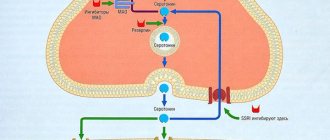One of the most common psychological disorders today is neurosis.
This disease can be a constant concern or be episodic, but in any case, neurosis greatly complicates a person’s life. If you do not seek qualified medical help in a timely manner, this disorder can lead to the development of more complex mental illnesses. Neuroses are reversible psychogenic disorders that arise due to internal or external conflicts, emotional or mental stress, as well as under the influence of situations that can cause mental trauma in a person. Obsessive-compulsive neurosis occupies a special place among neurotic disorders. Many experts also call it obsessive-compulsive disorder (OCD), but some doctors separate the two pathologies.
Why is this happening? The fact is that in Russian medicine, for a long time, obsessive-compulsive disorder and OCD were indeed considered different diagnoses. But the international classification of diseases ICD-10 used today does not contain such a disease as obsessive-compulsive disorder; this list of diseases only mentions obsessive-compulsive disorder. That is why recently these two formulations have begun to be used as a definition of the same mental pathology.
A person in this state suffers from intrusive, disturbing or frightening thoughts that arise involuntarily. The main difference between this disease and schizophrenia is that the patient is aware of his problems. He tries to get rid of anxiety through obsessive and tiresome actions. Only a qualified psychotherapist who has experience working with patients who suffer from this form of mental disorder can cure obsessive-compulsive disorder.
Causes of obsessive thoughts and fears
Obsessive-compulsive disorder (OCD), or obsessive-compulsive disorder (OCD), is an anxiety disorder in which the sufferer experiences annoying thoughts and actions.
A person is not able to resist them, so he often does strange things, gets nervous and worries a lot. Among the main causes of the syndrome of obsessive movements and ideas:
- Hereditary predisposition . If one of your relatives had OCD, then the child may also get sick.
- Organic pathologies . It has been found that patients with OCD have characteristic changes in the subcortical structures of the brain and the frontal cortex.
- Experienced psychological trauma . Usually people begin to fear what happened to them or someone they know.
- Disturbances in the production of serotonin in the brain, which leads to the progression of dangerous neurochemical disorders.
External and intrapersonal conflicts, frequent stress, deep belief in the supernatural, inadequately low self-esteem, psychological and physical fatigue increase the likelihood of developing the disease.
During the period of preparation for the treatment of obsessive disorders, it is not always possible to establish the cause of the pathology. This significantly complicates the tasks of doctors drawing up a correction scheme.
Reasons for development
Among the reasons for the development of obsessive-compulsive neurosis are usually cited stressful situations and overwork, but obsessive-compulsive disorder does not occur in all people who find themselves in a difficult life situation. What actually provokes the development of obsessive states has not yet been precisely established, but there are several hypotheses regarding the occurrence of OCD:
- Hereditary and genetic factors. Researchers have identified a pattern between the tendency to develop obsessive-compulsive disorder neurosis and unfavorable heredity. Approximately every fifth patient with OCD has relatives with mental disorders. The risk of developing this pathology increases in persons whose parents abused alcoholic beverages, suffered from a tuberculous form of meningitis, and also suffered from migraine attacks or epilepsy. In addition, obsessive-compulsive disorder may occur due to genetic mutations.
- A fairly large number of people (approximately 75%) suffering from obsessive-compulsive neurosis have other mental illnesses. The most likely accompaniments of OCD include bipolar disorder, depression, anxiety neurosis, phobias and obsessive fears, attention deficit hyperactivity disorder, and eating disorders.
- Anatomical features can also provoke obsessive-compulsive neurosis. Biological reasons also include a malfunction in some parts of the brain and the autonomic nervous system. Scientists have drawn attention to the fact that in most cases, with obsessive-compulsive neurosis, there is a pathological inertia in the excitation of the nervous system, accompanied by lability in the inhibition of ongoing processes. OCD can occur against the background of various dysfunctions of the neurotransmitter system. Neurotic level disorders arise due to a failure in the production and metabolism of gamma-aminobutyric acid, serotonin, dopamine and norepinephrine. There is also a version about the relationship between the development of obsessive-compulsive disorder neurosis and streptococcal infection. People who have had this infection have antibodies in their bodies that destroy not only harmful bacteria, but also the body’s own tissues (PANDAS syndrome). As a result of these processes, the tissues of the basal ganglia can be damaged, which can lead to the development of OCD.
- Constitutional-typological factors include special character traits (anancaste). Most patients are prone to constant doubts and are very cautious and cautious. Such people are very concerned about the details of what is happening, they are prone to perfectionism. Ananscasts are conscientious and very diligent people who strive to scrupulously fulfill their obligations, but the desire for perfection very often prevents them from completing the work they have started on time. The desire to achieve high results at work does not allow for the establishment of full-fledged friendships, and also greatly interferes with personal life. In addition, people with this type of character are very stubborn; they almost never compromise.
Treatment of obsessive-compulsive disorder should begin with identifying the causes of the disorder. Only after this will a treatment regimen be drawn up and, if necessary, medication prescribed.
COST OF TREATMENT FOR MENTAL DISEASES
The duration of treatment in a hospital is from 14 to 90 days, depending on the severity of the disease.
TREATMENT IN A HOSPITAL.
AMBULATORY TREATMENT
TREATMENT IN A HOSPITAL
Inpatient treatment – accommodation options
| Accommodation in a triple room | 10,000 rub./day |
| Double room | RUB 13,800/day |
| Single room of increased comfort | 16,000 rub./day |
| Treatment in a single VIP ward | 25,000 rub./day |
AMBULATORY TREATMENT
Ambulatory treatment
| psychiatrist | FOR FREE |
| Consultation with a psychiatrist (first appointment) – free of charge during hospitalization | 3,000 rub. |
| Full psychodiagnostics (all tests and procedures) | from 5,000 rub. |
| Appointment with the head physician of the clinic | 4,500 rub. |
| Consultation with a psychiatrist at home | from 4,000 rub. |
FREE CONSULTATION
Stages
Doctors distinguish three stages of development of the disease:
- The first one . Fear and negative thoughts arise only when a person is directly confronted with a traumatic situation.
- Second . The worries are becoming more and more frequent. The patient often has thoughts that something bad will happen to him or that he needs to do something urgently.
- Third . The patient is unable to get rid of bad thoughts on his own. They constantly pester him, which makes a normal lifestyle and productive work activity impossible.
OCD is most easily corrected at the first stage. In advanced cases, doctors have to put in much more effort to help the person.
Symptoms of the disorder
A doctor will be able to diagnose obsessive-compulsive disorder in a patient and prescribe appropriate treatment only if the main symptoms of the disorder have been observed for a long period of time (at least two weeks). OCD manifests itself like this:
- presence of obsessive thoughts. They can be regular or occur periodically, remaining in the head for a long time. Moreover, all images and attractions are very stereotypical. A person understands that they are absurd and ridiculous, but nevertheless perceives them as his own. The OCD patient also realizes that he cannot control this flow of thoughts, as well as control his own thinking. During the thought process, a person suffering from obsessive-compulsive disorder periodically has at least one thought that he tries to resist. Someone's first and last names, names of cities, planets, etc. may persistently come to mind. A poem, quote, or song may be replayed in your brain over and over again. Some patients constantly talk about topics that have nothing to do with reality. Most often, patients are worried about thoughts of panic about infectious diseases and pollution, about painful loss or the predetermination of the future. Patients with obsessive-compulsive disorder may experience a pathological desire for cleanliness, a need to maintain a special order or symmetry;
- Another important symptom of obsessive-compulsive neurosis is the desire to perform any actions that reduce the intensity of anxious thoughts. This behavior is called compulsive, and regular and repeated actions of the patient are called compulsions. The patient's need to perform specific actions is a conditional “obligation.” Compulsions rarely bring moral pleasure to a sick person; such “ritual” actions can only make one feel better for a short time. Among such obsessive actions one can note the desire to count specific objects, commit immoral or illegal acts, repeatedly check the results of one’s work, etc. A compulsion is the habit of squinting your eyes, sniffling, licking your lips, winking, licking your lips, or twirling long strands of hair around your finger;
- Doubts that constantly plague the patient can also indicate the presence of obsessive-compulsive disorder. A person in such a state is not confident in himself and his own abilities, he doubts whether he has performed the necessary action (turned off the water, turned off the iron, gas, etc.). Sometimes doubts reach the height of absurdity. For example, a patient can repeatedly check whether the dishes have been washed, and at the same time wash them every time;
- Another symptom of obsessive-compulsive neurosis is the patient’s fears that are groundless and devoid of logic. For example, a person may be terribly afraid of speaking in public; he is afraid of the thought that he will definitely forget his speech. The patient may be afraid to visit public places; it seems to him that he will definitely be ridiculed there. Concerns may relate to relationships with the opposite sex, inability to sleep, fulfilling work obligations, and the like.
The most striking example of obsessive-compulsive neurosis is the fear of getting dirty and contracting a fatal disease after contact with germs. In order to prevent this “terrible” infection, the patient tries in every possible way to avoid public places, he never eats in cafes or restaurants, and does not touch door handles or handrails on stairs. The home of such a person is practically sterile, since he carefully cleans it using specialized means. The same applies to personal hygiene; OCD forces a person to wash their hands for hours and treat the skin with a special antibacterial agent.
Obsessive-compulsive disorder is not a dangerous disorder, but it complicates the life of an individual so much that he himself begins to think about the question of how obsessive-compulsive neurosis can be cured.
Signs of obsessional neurosis
Among the signs characteristic of the disorder:
- obsessive fears that have no good reason;
- harassing thoughts and judgments;
- obsessions;
- actions of the same type, reminiscent of a ritual.
Patients with OCD may be afraid of getting infected with something, meeting someone, or not liking someone. Many of them have a painful form of perfectionism. Then a person tries to achieve ideal order and cleanliness in everything. The most common “rituals” are checking whether the front door is closed, whether the gas stove or lights are turned off. A sick person may wash their hands too often or look out the window.
Patients often come up with very unusual rituals - for example, they squat three times before putting on their shoes, or turn around their axis several times before entering the apartment. This behavior seems very strange to others.
Symptoms of obsessive disorders
People who suffer from OCD complain of:
- intrusive thoughts that occur too often;
- internal experiences;
- increased level of aggression;
- worries about loved ones;
- fear of possible events;
- inability to resist obsessions;
- inability to relax;
- insomnia.
Psychologists have noticed that people of a melancholic temperament, who are suspicious, worry about trifles and take any problems very seriously, are more likely to experience the disorder. They are unsettled by any stress or conflict.
Diagnosis of OCD
According to the International Classification of Diseases (ICD-10), to make a diagnosis, it is important that obsessions and/or compulsions have been observed with noticeable frequency for at least two consecutive weeks and are accompanied by a state of distress. Symptoms must have the following characteristics:
- The patient's thoughts or impulses are his own, not caused by external factors.
- There is at least one thought or action that the patient tries unsuccessfully to resist.
- The thought of performing a compulsive action is in itself unpleasant (merely reducing tension or anxiety is not considered pleasant in this sense).
- Thoughts, images, or impulses repeat themselves in a stereotypical manner.
When diagnosing OCD, it is important to separate its symptoms from those of other diseases. Obsessions and compulsions can develop during exacerbations of schizophrenia, as well as with Tourette's syndrome. Problems similar to OCD may also be characteristic of obsessive-compulsive personality disorder. But if people with OCD realize that their obsessive actions are irrational, and they themselves experience discomfort from them, for a person with a personality disorder, the obsessive desire for accuracy is perceived as a manifestation of perfectionism and brings him pleasure.
Dealing with the disorder
The basis of treatment for obsessive-compulsive neurosis is psychotherapy. It is very important to carry out deep work with the patient’s psyche in order to achieve positive dynamics. A psychotherapist helps you overcome:
- depressive ideas;
- pessimism;
- anxiety;
- obsessive thoughts.
To achieve this, she conducts group, individual and cognitive behavioral therapy sessions. In some cases, music therapy and art therapy are used. If the case is advanced, additional medications are used.








